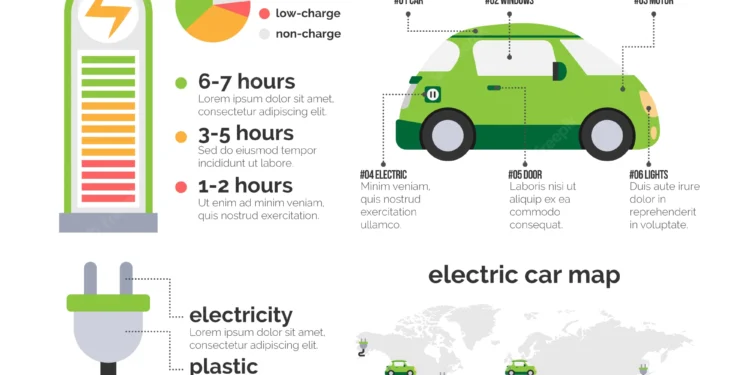Many factors can contribute to the success of an electric vehicle (EV) program. Factors that influence the adoption of EVs include government support, charging infrastructure, affordability, and consumer familiarity with new technology. Every country has its own unique set of challenges that need to be addressed in order for an EV initiative to be successful.
While some challenges can be overcome through proper planning and implementation, others might prove to be too difficult to overcome. In some cases, it may not even be possible for a certain country to make the transition from conventional vehicles towards EVs due to recessive factors. This article analyzes various reasons why an EV program might not succeed in various countries and how these challenges can be overcome with proper strategic planning and implementation.
Government support

Government support is one of the most important factors that can influence the success of an EV initiative. In an effort to reduce greenhouse gas emissions, governments all over the world are increasingly incentivizing the adoption of EVs. Some of these policies include subsidies on EV purchase or lease, free parking spaces for EV charging stations, and tax breaks for EV charging.
Growth in EV penetration can be hampered if governments fail to meet the goal of increasing EV use. Governments can use a variety of different methods to support EV growth. Some of these methods include providing subsidies for EV charging, setting minimum parking space requirements for EV charging stations, and introducing complimentary public transportation programs.
It is important to note that EV programs can be a costly endeavor that requires significant investment. Government subsidies can help reduce the initial costs of EV ownership and make them more accessible to a wider audience. However, it is essential that these subsidies are consistent. Furthermore, incentives can be a great way to encourage change, but the best strategy is to make EV ownership more accessible to the average consumer.
Lack of charging infrastructure

Another challenging factor that can affect the success of an EV program is a lack of charging infrastructure. Without sufficient charging stations, EV drivers will have to travel a significant distance to charge their cars. This might prove to be inconvenient for certain drivers and could also lead to a lack of trust between EV and Conventional vehicle drivers. If an EV program does not have sufficient charging infrastructure, EV drivers will have to travel significant distances to charge their cars.
This could lead to inconvenient driving circumstances and a lack of trust between EV drivers and Conventional vehicle drivers. Many countries are still developing charging infrastructure and this could prove to be a major challenge. Furthermore, existing charging infrastructure can also pose a challenge. In many locations, there could be a shortage of charging points that could prevent EV adoption. This can be due to a lack of charging infrastructure or due to the fact that the public charging points are not well maintained.
Lack of affordability
Affordability is another key factor that can influence the success of an EV initiative. In order to make it financially accessible for the average consumer, EVs need to be priced no more expensive than a conventional vehicle. Evolving the automotive industry and adopting more sustainable practices are beneficial for society.
However, there are certain initiatives that can be adopted regardless of the financial benefits. One such initiative that can have a major positive impact is the adoption of EVs. EVs are clean, pollution-free vehicles that can offer a number of benefits. These benefits include better road safety, reduced emissions, and reduced CO2 emissions. However, all these benefits need to be properly understood and accepted by the general public.
Consumer unfamiliarity with new technology

Another factor that can negatively impact the success of an EV initiative is the lack of familiarity among consumers with new technology. In order to successfully launch an EV program, consumers need to be made aware of the benefits that EVs can offer.
One of the most crucial factors that can influence the success of an EV initiative is consumer familiarity with the technology. Consumers need to be made aware of the benefits that EVs can offer. EVs are an advanced technology that can offer better road safety and reduced emissions. However, it is essential that consumers are familiar with the benefits that EVs can offer.
Recessive culture towards EVs
A final factor that can negatively affect the success of an EV initiative is a recessive culture towards EVs. In order to encourage the adoption of EVs, governments need to make a concerted effort to promote the various benefits that EVs can offer.
The adoption of EVs can have a major impact on the environment and reduce greenhouse gas emissions. One of the most important benefits that can be promoted is the reduction in emissions. EVs are clean, emission-free vehicles that can have a major positive impact on the environment. EVs can be promoted as a more sustainable and environmentally friendly alternative to traditional vehicles.
Other challenges

Other challenges that can negatively impact the success of an EV initiative include improper implementation of existing charging infrastructure, insufficient charging infrastructure, and insufficient public awareness. It is essential to manage and control the growth of EV charging demand. This means that the charging infrastructure should be managed properly so that the demand for charging is proportional to the use of the charging points.
It is also important to assess the current charging infrastructure and make sure that it is compatible with the charging points that will be installed as part of an EV initiative. If the current public charging infrastructure is incompatible with future EV charging infrastructure, it can create complications that could hinder the growth of EV adoption.
Conclusion
EVs have the potential to be an important contributor to the transportation sector in many countries. However, this potential can only be realized if governments make a concerted effort to support the growth of EVs. It is important to note that EVs are a new technology with certain challenges that need to be overcome. Governments can use a variety of different methods to support the adoption of EVs. Some of these methods include providing subsidies for EV charging, setting minimum parking space requirements for EV charging stations, and introducing complimentary public transportation programs.
It is essential to manage and control the growth of EV charging demand. This means that the charging infrastructure should be managed properly so that the demand for charging is proportional to the use of the charging points. If consumers are unfamiliar with the benefits that EVs can offer, it can dramatically impair the growth of EVs. It is also essential to assess the current charging infrastructure and make sure that it is compatible with the charging points that will be installed as part of an EV initiative.









